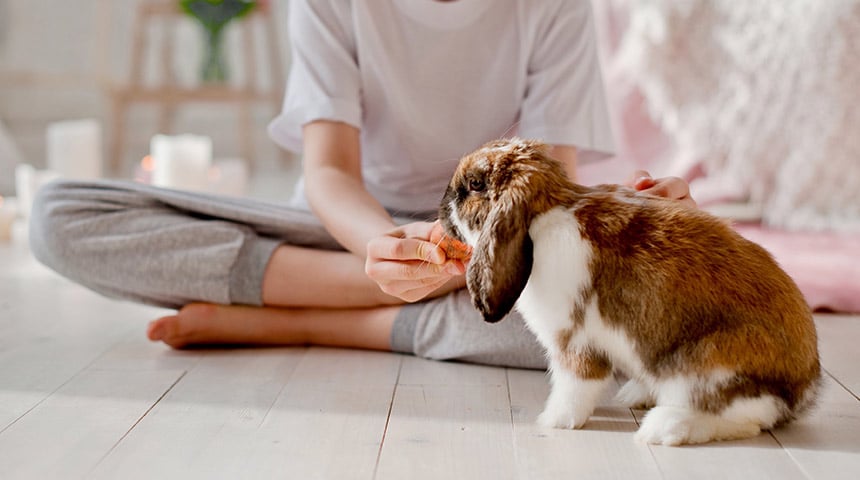He jumps around with agility. He is litter trained. He is playful, friendly and gentle. He may be an Angora or Rex breed, for example. He rubs his face on surfaces to deposit his scent. I am, of course, talking about the trendy new type of cat...the domestic rabbit.
There is currently a massive craze for this animal, whether in pet shops, shelters or veterinary clinics, where we are seeing them more frequently. They're so adorable with their big ears and little wiggly nose. You may think, "My kids will love him!"-but the question to ask yourself before any spontaneous purchase: is a pet rabbit right for me, my lifestyle and my family?
Are you ready?
The rabbit can be trained to go to a litter box if it is cleaned properly every day. It is a small eating machine on legs! As long as he eats, everything is fine, and he’ll be happy. He will need his own groceries, as rabbits love vegetables, which they should eat at least one cup a day or even more, depending on his weight. They also need to be given plenty of quality hay, as it is essential to their diet and to ensure proper wear and tear on their teeth. He will need to exercise every day. That’s why it’s important to rabbit-proof the areas of the house where he will have access, i.e., securing them to avoid accidents with electric wire or anything else he might want to nibble on. Rabbits have a very fragile spine and powerful hind legs; that’s why it’s not advisable to leave them with young children without supervision, as they could unintentionally hurt them.
Before adopting your new fury friend, have you found a vet?
Before adopting a rabbit, it is important to find a veterinary team that can provide care, as not all veterinarians are familiar with this species. Just like any other animal, your rabbit should see his vet regularly to ensure that he remains healthy.
In addition, neutering should be considered. It reduces expressed sexual behavior such as territoriality, helps prevent cancer, and reduces abandonment of kits that are born every 30 days at a rate of 4-5 per litter. And let’s not forget that in the wild, the rabbit is prey. If several animals are already living in the house, could they be a potential predator? For example, a ferret would not make a good housemate for a rabbit.
Which rabbit should you choose?
Once your budget has been planned, the house has been arranged, family members have been informed and a vet has been found, all that’s left to do is look for your new pet.
There are numerous rabbit breeds, from small (Dutch dwarf) to large (Flanders giant), hairy (English angora) to very soft (rex). It is advisable to find out more about the breed you are interested in and its particularities (grooming, shedding, temperament, sociability with other animals, etc.) from a breeder before making a definitive choice.
It is possible to adopt a rabbit from a shelter that has been professionally assessed. The shelter staff will be able to help you get the perfect match with your future furball.
No matter which one you choose, avoid adopting a cottontail rabbit from your garden! We do have rabbits living in nature throughout Quebec. Please let them live their lives in the wild, they will always be happier there than in your home!
Stéphanie P. TSAc
Hôpital Vétérinaire Blainville





